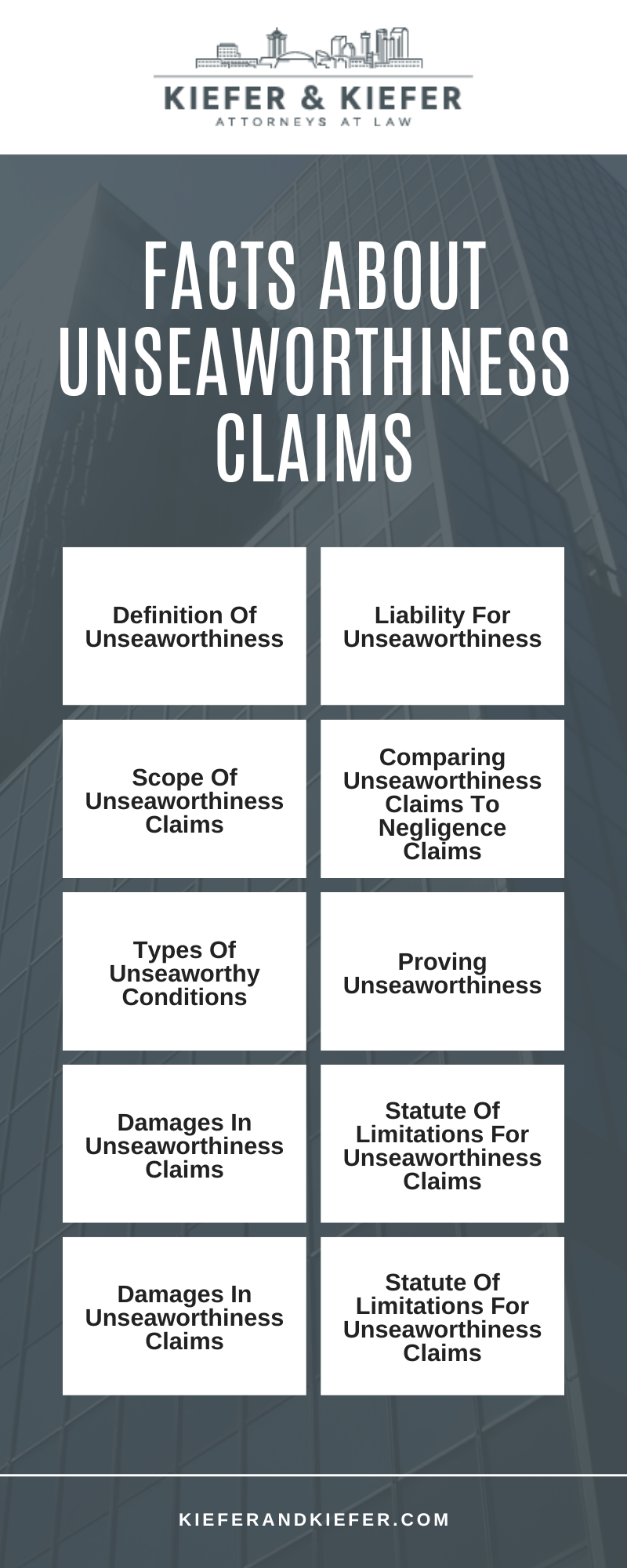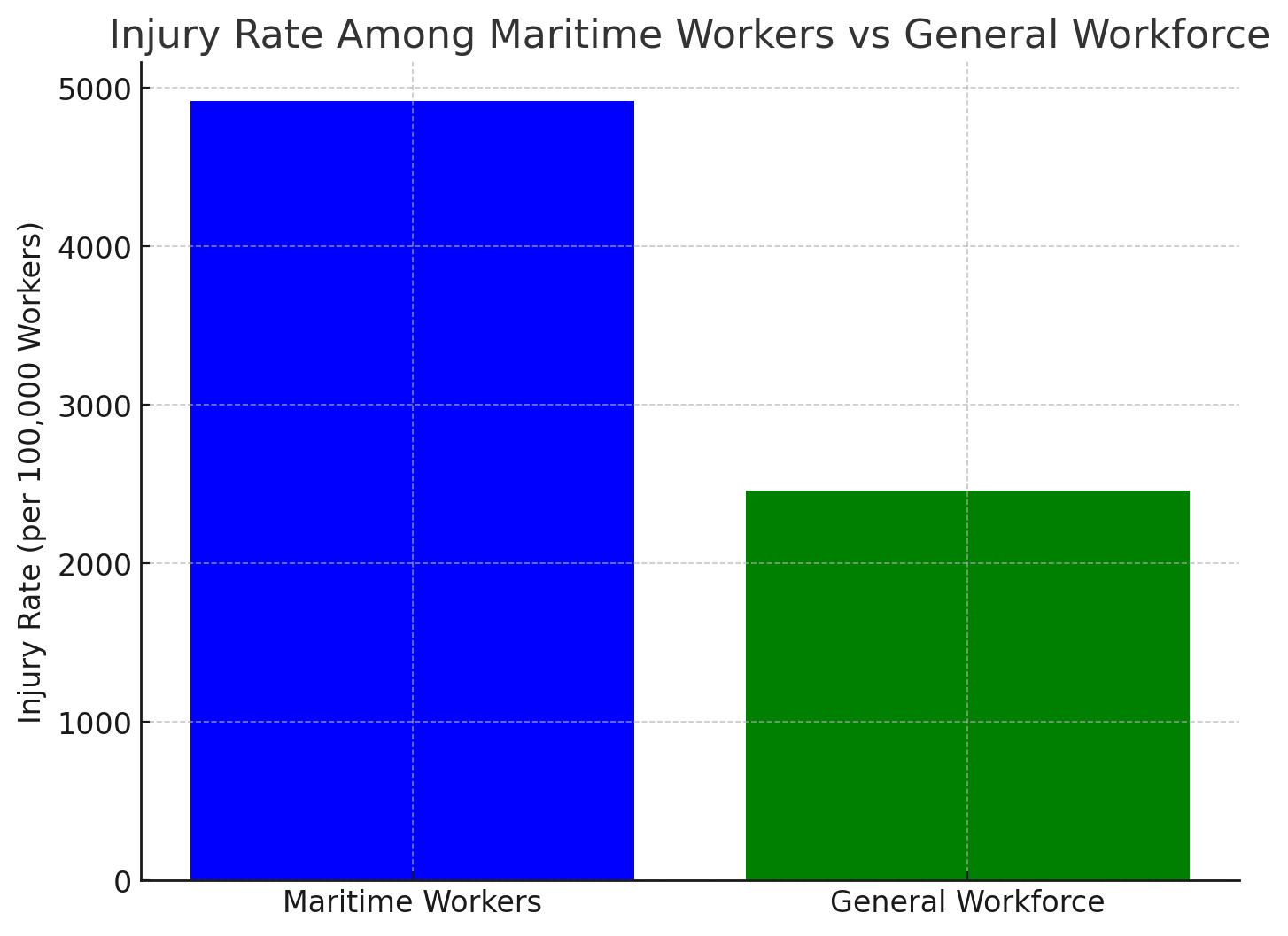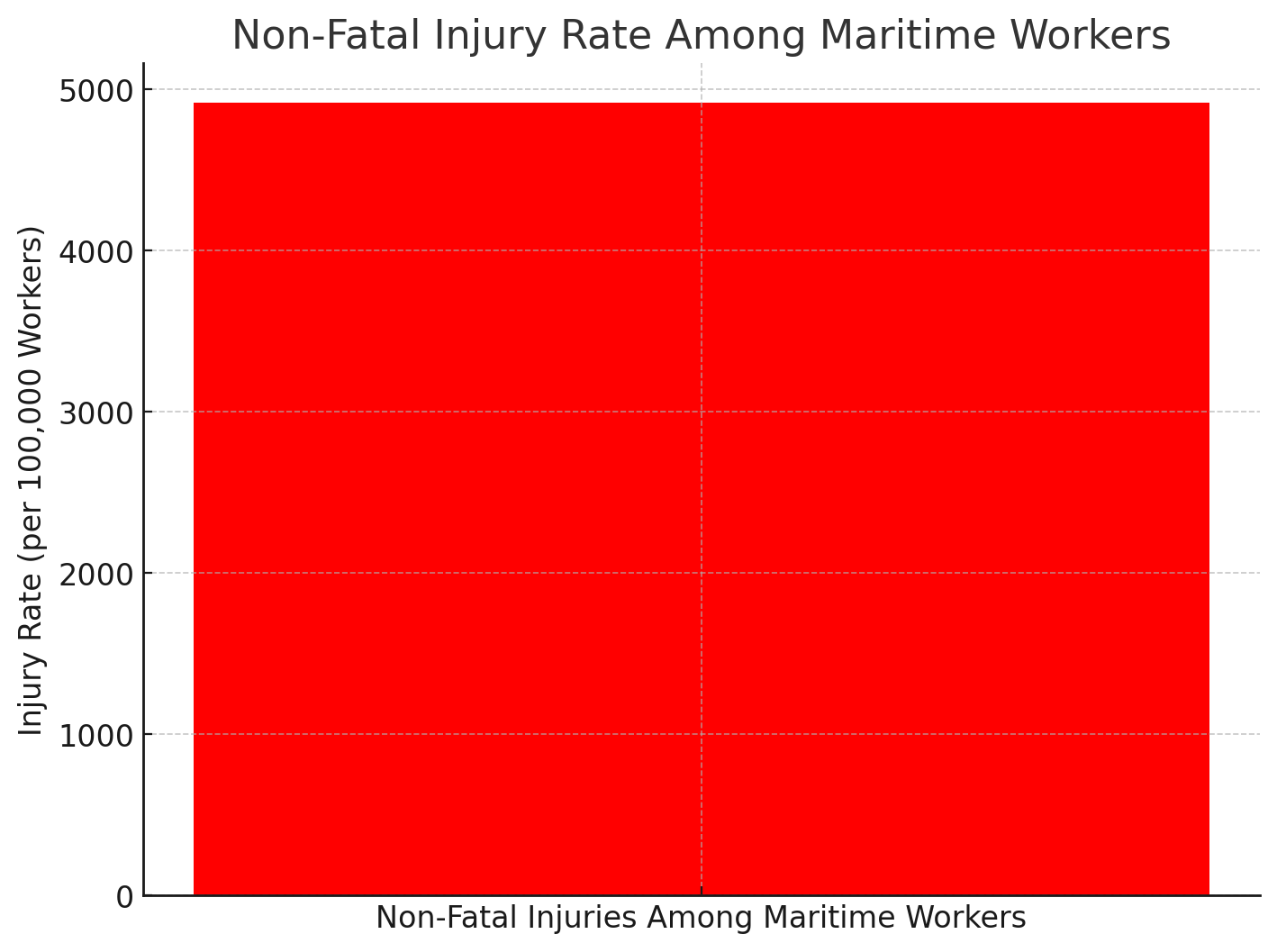
Jones Act Lawyer New Orleans, LA
If you were injured as a maritime worker working in U.S. navigable waters (including on both rivers like the Mississippi and offshore, in the Gulf), then you have the right to file suit. However, the legal process can be complicated, and employers and their insurance companies will likely fight back. You need the help of our skilled New Orleans, LA Jones Act Lawyer to guide you through the process and litigate on your behalf.
The Jones Act, also known as the Merchant Marine Act of 1920, protects U.S. maritime workers if they’re injured on the job. It permits certain workers, including ship crews and seamen, longshore workers, and boat crews, to file a lawsuit against their employer for creating unsafe working conditions or general negligence, with the goal of securing compensation to cover their medical bills and other losses. Contact our team at Kiefer & Kiefer today.
Table of Contents
Your Rights Under The Jones Act
The Jones Act was developed by lawmakers who recognized the dangerous working conditions of offshore oil rigs, barges, and other vessels. Even with the best safety protocols and protective equipment, the chances of someone experiencing life-changing injuries is high. Help is usually miles away, with no guarantee it will arrive in time. The Jones Act protects the interests and rights of maritime workers operating at least three miles offshore, including both those on vessels and those in the oil and gas industry.
Even if you’re not specifically covered by The Jones Act, you may still be able to file a lawsuit for compensation after an injury. Those working in maritime-affiliated positions closer to or on land, like dock workers or longshoremen, may be covered under the Longshore and Harbor Workers’ Compensation Act. Determining the extent of compensation available to you and how much compensation you are eligible for can be tricky, though. Hiring our lawyer to help you may increase the possibility of a large settlement and the justice you deserve.
Our lawyer is focused on helping injured maritime workers understand the difference between a Jones Act claim and other types of workers’ compensation claims. We can gather evidence proving negligence on the part of your employer and develop a strong case against them. Many Jones Act claims are settled out of court, in mediation. Our lawyer can represent you in negotiations, fighting for your interest and yours alone.
Unlike workers’ comp claims, Jones Act injury cases permit the injured worker to demand compensation for non-economic losses, like pain and suffering from their injuries and a loss of quality of life if they’re disabled or disfigured. Our lawyer can properly value the amount for non-economic compensation and fight for what you’re owed.
How We Can Help You
Our Jones Act lawyer is a legal professional who focuses in maritime law, specifically the Merchant Marine Act of 1920, commonly known as the Jones Act. This legislation pertains to the rights of maritime workers, particularly those injured while working on vessels, and Jones Act Lawyers are adept at handling cases related to these matters.
What The Jones Act Covers
The Jones Act covers a broad spectrum of protections for maritime workers, including seamen, crew members, and offshore workers. It provides the right for these individuals to seek compensation if they suffer injuries or illnesses due to the negligence of their employers or unsafe working conditions.
If you are a maritime worker and have sustained injuries during the course of your employment, it’s advisable to consult our Jones Act Attorney promptly. Seeking legal advice early makes sure that you understand your rights and can take appropriate actions to secure compensation for your injuries.
Types Of Cases We Handle
Our lawyers handle a variety of cases involving maritime injuries, including accidents on ships, oil rigs, or other offshore structures. We also address cases related to unseaworthiness, negligence, or wrongful death that may occur during maritime employment.
Our team can provide vital assistance by evaluating the circumstances surrounding your maritime injury, determining liability, and pursuing legal action against responsible parties. We can help you obtain compensation for medical expenses, lost wages, pain and suffering, and other damages resulting from the injury.
Recovering Damages
To qualify as a Jones Act seaman, you must meet specific criteria, such as spending a significant amount of your time working on a vessel that is “in navigation.” Jones Act lawyers can assess your situation to determine if you meet the qualifications to seek protection under the Jones Act.
The Jones Act allows injured maritime workers to seek various damages, including medical expenses, rehabilitation costs, lost wages, pain and suffering, and other related expenses. Our attorneys work to build a strong case to maximize the compensation our clients can recover.
It is essential to act promptly when considering filing a Jones Act claim. The statute of limitations for these claims can vary, and consulting with our injury attorney as soon as possible allows you to meet the necessary deadlines for filing your case.
Facts About Unseaworthiness Claims
At Kiefer & Kiefer, we understand the importance of unseaworthiness claims for maritime workers who have been injured due to unsafe conditions aboard vessels. Unseaworthiness claims are an important aspect of maritime law, providing injured seamen with legal recourse and compensation for injuries caused by unseaworthy conditions. Here, our New Orleans injury firm provides essential information about unseaworthiness claims to help maritime workers protect their rights and seek justice:
Definition Of Unseaworthiness
Unseaworthiness refers to the failure of a vessel or its equipment to meet the standards necessary for safe operation at sea. This can include issues such as defective equipment, inadequate crew training, lack of proper maintenance, or unsafe working conditions aboard the vessel. If there is any question to the validity and sturdiness of a vessel, it might be able to be considered unseaworthy.
Liability For Unseaworthiness
Under the Jones Act, vessel owners and operators have a legal duty to provide seamen with a seaworthy vessel and safe working conditions. If a vessel is unseaworthy and a seaman is injured as a result, the vessel owner may be held liable for the seaman’s injuries.
Scope Of Unseaworthiness Claims
Unseaworthiness claims can encompass a wide range of injuries and accidents, including slip and falls, equipment failures, fires, explosions, and other hazards encountered aboard vessels. These claims focus on the unseaworthy condition that led to the injury, rather than the negligence of the vessel owner or crew.
Comparing Unseaworthiness Claims To Negligence Claims
While negligence claims under the Jones Act require proof of fault or negligence on the part of the vessel owner or crew, unseaworthiness claims do not. Instead, unseaworthiness claims focus on the condition of the vessel itself and whether it was fit for its intended purpose at the time of the injury. Our experienced lawyer can help determine which type of claim is best for your injury.
Types Of Unseaworthy Conditions
Unseaworthy conditions can take many forms, including defective equipment, inadequate safety measures, slippery decks, unsafe stairways, and lack of proper lighting. Any condition that renders the vessel unsafe for its intended use may give rise to an unseaworthiness claim.
Proving Unseaworthiness
To prevail in an unseaworthiness claim, the injured seaman must demonstrate that the unseaworthy condition existed at the time of the injury and that it directly caused or contributed to their injuries. This often requires gathering evidence such as witness statements, maintenance records, and expert testimony.
Damages In Unseaworthiness Claims
Injured seamen may be entitled to various damages in unseaworthiness claims, including medical expenses, lost wages, pain and suffering, and loss of earning capacity. Unlike negligence claims, punitive damages are not typically available in unseaworthiness claims. Our attorney can walk you through what you qualify for with your specific case.
Statute Of Limitations For Unseaworthiness Claims
It’s essential for injured seamen to be aware of the statute of limitations for filing unseaworthiness claims. In general, unseaworthiness claims must be filed within three years of the date of the injury, although there may be exceptions depending on the circumstances.
New Orleans Jones Act Infographic
New Orleans Jones Act Statistics
Although exact data is not available, studies show that the injury rate among maritime workers, including merchant mariners, is significantly higher than the general workforce, with non-fatal injuries occurring at a rate of around 4,916 per 100,000 workers annually, which is roughly twice the rate of other U.S. workers
If you have been injured, call our New Orleans Jones Act attorney for legal assistance.
 Jones Act FAQs
Jones Act FAQs
Maritime work is known for its inherent risks, but your New Orleans Jones Act lawyer can help you get the compensation you deserve. Kiefer & Kiefer was founded over 60 years ago to help our clients recover from their personal injuries. Now, it’s time to help you. If you suffered injuries as a maritime worker, get in touch with our New Orleans Jones Act lawyer. You may be entitled to compensation. Here are some frequently asked questions and answers about Jones Act lawyers.
How Does The Jones Act Protect Seamen Injured On The Job?
The Jones Act is a federal statute that enables seamen who are injured in the course of their employment to pursue compensation from their employers. This law applies to injuries resulting from an employer’s negligence or a vessel’s unseaworthiness. Essentially, if an employer’s negligence can be shown to have contributed to the injury, a seaman can seek damages for losses incurred as a result.
What Types Of Compensation Can I Seek Under The Jones Act?
Under the Jones Act, seamen can seek various forms of compensation that cover both economic and non-economic damages. Economic damages include medical expenses, lost wages, and the cost of future care related to the injury. Unlike some workers’ compensation claims, where benefits can be quite restrictive, the Jones Act allows for a broader range of damages, reflecting the potential severity and long-term impact of maritime injuries.
What Evidence Is Needed To Support A Claim Under The Jones Act?
To support a claim under the Jones Act, your attorney will need comprehensive evidence to demonstrate both the extent of your injuries and your employer’s fault. This evidence typically includes medical records that document the injuries, testimonies from witnesses to the incident, expert opinions on industry standards and the employer’s adherence to these standards, and documentation of the vessel’s condition and maintenance records.
What Distinguishes A Jones Act Claim From Other Maritime Injury Claims?
Jones Act claims are specifically designed for “seamen,” a term that encompasses individuals whose work contributes to the function of a vessel or the accomplishment of its missions. Unlike the Longshore and Harbor Workers’ Compensation Act, which covers dock and harbor workers, the Jones Act requires a demonstration of employer negligence.
What Role Does Maintenance And Cure Play In A Jones Act Case?
Maintenance and cure are fundamental aspects of maritime law that require an employer to provide for an injured seaman’s basic living expenses (maintenance) and medical care (cure) until they have reached maximum medical improvement. This obligation is independent of fault and exists regardless of whether the injury was caused by negligence.
New Orleans Jones Act Glossary
At Kiefer & Kiefer, our team has spent over 60 years supporting injured maritime workers in New Orleans, Louisiana. Below, we break down essential terms and concepts related to the Jones Act, making sure you understand your rights after an injury.
Unseaworthiness
Unseaworthiness refers to the condition of a vessel that makes it unsafe for its intended use. This can include defective equipment, lack of maintenance, or insufficient crew training. For instance, if an improperly maintained winch on a cargo ship fails and causes an injury, the vessel may be deemed unseaworthy. Vessel owners are legally obligated to provide a seaworthy vessel to their crew, and failing to do so can result in significant consequences under the Jones Act. Claims for unseaworthiness focus on the vessel’s condition, not the actions of the employer or crew.
Maintenance And Cure
“Maintenance and cure” is a fundamental protection under maritime law. Maintenance refers to financial support for a seaman’s basic living expenses while they recover, while cure covers their necessary medical treatment until they reach maximum medical improvement. These benefits apply regardless of who is at fault for the injury. For example, if a seaman suffers a back injury while working on a tugboat, their employer must pay for rent, food, and medical bills until they can safely return to work or are declared unable to improve further. Maintenance and cure obligations are critical for injured workers who face prolonged recoveries.
Jones Act Seaman Status
To qualify for protection under the Jones Act, an individual must be classified as a “seaman.” This designation applies to workers who spend a significant portion of their time on a vessel “in navigation” and contribute to its mission. For example, a deckhand working on a commercial fishing boat in the Gulf of Mexico is considered a seaman, while a worker employed exclusively onshore is not. Determining seaman status is vital because only seamen are eligible to pursue compensation under the Jones Act, distinguishing these claims from other maritime injury claims.
Pain And Suffering Compensation
Unlike many workers’ compensation systems, the Jones Act allows injured seamen to recover compensation for non-economic losses, including pain and suffering. This encompasses physical discomfort, emotional distress, and a diminished quality of life resulting from their injuries. For instance, a seaman who suffers a permanent injury after falling on an oil rig deck may seek compensation for their ongoing physical pain and the emotional toll of losing their ability to work in their chosen field. Pain and suffering compensation reflects the broader impact that an injury can have on a worker’s life.
Jones Act Claim Process
Filing a claim under the Jones Act involves proving that an employer’s actions or unsafe working conditions contributed to the injury. This often requires collecting detailed evidence such as witness statements, maintenance records, and medical evaluations. For example, if a crew member slips on an oil-slicked deck, their attorney might gather testimony from coworkers and maintenance logs showing a lack of safety protocols. Many Jones Act cases are resolved through settlements, but others may proceed to trial to secure appropriate compensation. Acting quickly is essential, as time limits apply to filing these claims.
Kiefer & Kiefer, New Orleans Jones Act Lawyer
1100 Poydras St Ste 1300, New Orleans, LA 70163
Contact Our New Orleans Firm Today
If you are a maritime worker who has suffered an injury, it is important to explore all your legal options under the Jones Act. At Kiefer & Kiefer, our team is committed to providing you with the knowledgeable and empathetic legal representation you need to manage your claim successfully. Contact us today to learn more about how our personal injury lawyers can help you secure the compensation you deserve for your injuries.
Let us put our experience to work for you. Reach out to our office and see how our New Orleans Jones Act lawyer can help.
Read more of our Google reviews and let us know how we can help you with your Jones Act case.




 Jones Act FAQs
Jones Act FAQs
